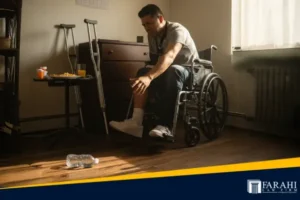Summary
Traumatic brain injuries often leave lasting emotional effects like anxiety, depression, and PTSD. In California, these mental impacts can be compensable under personal injury law if properly documented. Learn how to prove emotional distress in TBI claims and secure the financial support you deserve.
Table of Contents
The emotional toll of a traumatic brain injury can be as devastating as the physical harm. For many in Los Angeles, these effects are hidden beneath the surface—yet they disrupt relationships, careers, and daily living. Victims of such injuries often face not just medical bills but profound changes to their quality of life.

When emotional harm follows a head injury, the law may allow recovery for pain and suffering. Understanding the legal path for TBI claims can make all the difference in getting justice and support.
Why Emotional Distress Is Often Overlooked
In personal injury cases, physical symptoms often dominate the discussion, while psychological harm is minimized. Yet, emotional distress can have lasting consequences, from ongoing therapy needs to an inability to work.
Key reasons it’s overlooked:
- Lack of visible evidence compared to physical injuries.
- Limited understanding by insurance companies of mental health damages.
- Victims prioritize urgent medical treatment over emotional recovery.
Common Emotional Effects of TBI
A traumatic brain injury can change mood, behavior, and overall well-being. These impacts often worsen over time if left untreated.
Common emotional effects include:
- Anxiety and panic attacks – Persistent worry, fear, or sudden episodes of intense panic that can interfere with daily activities and social interactions.
- Depression and withdrawal – Feelings of sadness, hopelessness, or loss of interest in once-enjoyable activities, often leading to social isolation.
- Post-traumatic stress disorder (PTSD) – Intrusive memories, nightmares, or severe distress triggered by reminders of the accident or injury.
- Aggression or irritability – Heightened frustration, short temper, or anger outbursts that may strain relationships with family, friends, or coworkers.
- Difficulty controlling emotions – Rapid mood swings or reactions that feel disproportionate to the situation make it harder to maintain stability in everyday life.
The CDC reports that five years after experiencing a moderate to severe TBI, 33% of survivors depend on others for help with daily activities. Additionally, 29% express dissatisfaction with life, highlighting the significant connection between brain injuries and emotional well-being.
When Mental and Emotional Damages Are Compensable
Under California personal injury law, emotional damages are compensable when they stem directly from the accident. Victims may recover non-economic damages like pain and suffering and economic damages such as medical expenses and lost wages.
Situations where compensation is possible:
- Mental health professionals document emotional distress.
- PTSD following motor vehicle accidents.
- Anxiety or depression linked to catastrophic injury or brain damage.
- Decline in quality of life due to emotional changes.
How to Document and Prove Emotional Impact
Proving emotional distress in TBI claims requires strong evidence that meets legal standards.
Recommended documentation:
- Medical records from doctors and therapists.
- Testimony from expert witnesses.
- Journals tracking mood changes, anxiety, or depression.
- Proof of impact on work performance or relationships.
Tip: Insurance claims for pain and suffering are stronger when backed by consistent therapy records and professional evaluations. By hiring the best brain injury lawyers in Los Angeles, you gain the expertise needed to prove the full extent of your emotional damages.
Importance of Therapy Records and Expert Testimony
Therapy notes, psychiatric evaluations, and neuropsychological assessments serve as crucial evidence. These not only validate the emotional harm but also establish the need for ongoing medical treatment.
In Los Angeles, testimony from local neurologists or psychologists can also strengthen your case, primarily when the injury stems from car accidents or other personal injury cases.
Steps to Strengthen Your TBI Claim
If you or a loved one has suffered a head injury, following a clear process can improve your chances of maximum compensation.
Steps:
- Seek immediate medical treatment and continue recommended care.
- Retain all medical bills and therapy receipts.
- Keep a detailed record of symptoms and emotional challenges.
- Consult experienced brain injury lawyers for legal representation.
- Act before the statute of limitations expires in California.
- Avoid discussing your injury with an insurance company before getting legal advice.
Compassionate Legal Guidance for Complex TBI Claims
The emotional effects of a traumatic brain injury deserve the same attention as the physical ones. With the right legal team in Los Angeles, you can pursue compensation for economic and non-economic damages, easing the financial burden and helping restore your quality of life.
If you’ve experienced brain damage or another catastrophic injury due to someone else’s negligence, our brain injury attorneys can help. Contact us today for a free consultation and learn about your legal rights and how we can secure the justice and money you deserve.
FAQs
Yes, emotional distress can be compensated if you can prove it resulted from another party’s negligence, supported by medical records or expert testimony.
Under the statute of limitations, you typically have two years from the date of the injury to file a claim.
Yes, they often require more evidence, multiple experts, and a deeper understanding of medical and legal issues.
Look for experienced legal representation with a proven track record in personal injury law, primarily involving motor vehicle accidents and catastrophic injuries.



